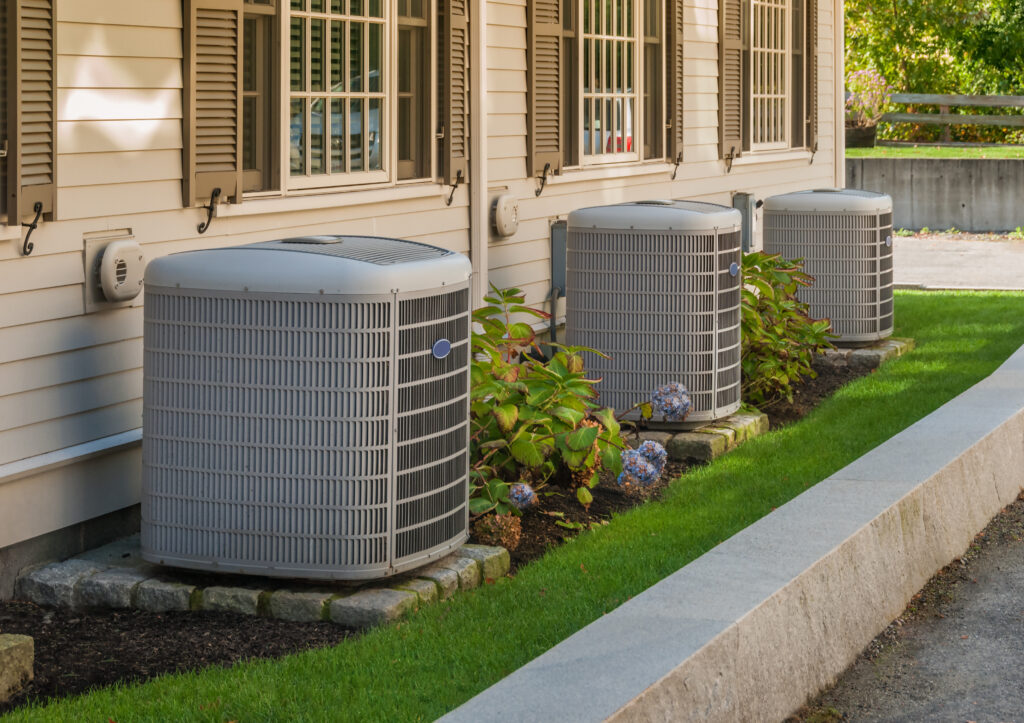That HVAC system in your backyard, window, alleyway, or up on your building’s roof is easy to take for granted. All summer long it pumps crisp and cool air throughout your spaces—maximizing your comfort while minimizing humidity and airborne debris.
But widespread HVAC system use is actually a modern phenomenon!
Even just a few decades ago, a full 23% of US households weathered summers with no HVAC system. These homes relied on thick walls and small windows to keep the sun out, or used natural breezeways and courtyards to improve indoor ventilation. But today, as temperatures continue to rise across the country, nearly 90% of all homes in the US use some form of air conditioning.

HVAC systems have transformed how we live, work, travel, and leisure. No wonder it’s hard to imagine life without convenient climate control!
The advanced HVAC systems that cool our homes today are far different from the earliest home cooling systems
In the early 20th century, as more people moved into crowded cities and air pollution made indoor living less than comfortable, technology like electric fans and evaporative coolers became popular. These basic inventions didn’t do much to cool the air, but they did provide some relief from the sweltering heat and humidity.
John Gorrie, a Florida inventor and physician, set out to change that.
Gorrie’s revolutionary “air conditioner” relied on air and ice.
In 19th-century Florida, yellow fever was one of the most pervasive and deadly illnesses around. Gorrie realized that the hot, humid Florida climate was likely contributing to his patients’ illnesses, and began experimenting with small machines that could cool the air in his patients’ rooms.
In 1851, Gorrie was granted a patent for his air conditioning machine that cooled the room by compressing and expanding air to make ice. The machine wasn’t exactly a best seller—it required a horse, water, wind, or steam to operate—but his idea did inspire a series of inventions that led to the HVAC system we know today.
William Carrier, the Father of Air Conditioning, picked up where Gorrie left off.
A local printing and publishing company faced a serious problem—high indoor humidity was affecting the paper they used to print books and newspapers. So they hired William Carrier, a mechanical engineer, to fix it.
Carrier’s ingenious invention, called the “Apparatus for Treating Air,” didn’t just cool the air. It pulled the moisture right out of it! By using a series of coils and fans to reduce the air temperature and cause the moisture to condense and flow out of the system, he successfully reduced indoor humidity and saved the company’s paper.
Carrier continues to be one of the most well-known HVAC system manufacturers in the industry—all thanks to William Carrier’s innovative thinking.
Frigidaire and General Electric wasted no time entering the industry.
Carrier launched his air conditioning company in 1915. Just three years later, in 1918, Frigidaire Corporation followed suit.
Frigidaire and General Electric, which launched their own A/C unit in 1932, soon began marketing their climate control systems as a luxury for the wealthiest families in the country. But air conditioners didn’t take off until the 1950s, when more Americans could afford comfort systems.
In the years that followed, new innovations like central air conditioning systems and ductless mini-splits made cool air more affordable, reliable, and efficient than ever.
General Electric also paved the way for commercial HVAC systems by developing large units that could support factories, warehouses, and retail spaces. These vast facilities were often hot, humid, and full of airborne illnesses—but GE’s technology quickly began to improve working conditions across the country.
Today, millions of homes and businesses rely on HVAC systems for cool comfort and improved air quality.
Advances in HVAC technology have made climate control more affordable and accessible than ever. It’s no wonder ACs are now practically a requirement for indoor living! Over the next few decades, we expect air conditioning to become increasingly efficient, more environmentally friendly, and more easily personalized by the home and business owners who rely on it.

At Refrigeration Heroes, we help North and South Carolina businesses keep their cool.
If learning more about the history of the HVAC unit has you curious about your own unit’s future, our expert team can help. Call (864) 834-4078 in South Carolina or (828) 688-0323 in Western North Carolina to learn more about our system inspections, efficiency improvements, and affordable preventative maintenance plans!

